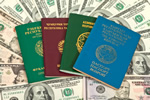Study shows Thailand toxic smog linked to increased respiratory disease and death

Study shows Thailand toxic smog linked to increased respiratory disease and death
For several decades, Thailand’s northern provinces have been a refuge for expat retirees looking for the comforts of year-round hot weather combined with a reasonably inexpensive cost of living. For brief periods after the end of the rainy season, burning of crops and forested areas both in Thailand and other neighbouring states has resulted in pollution from the fires forming in valley areas such as Chiang Mai and Chiang Rai as polluted air is swept in and trapped by the surrounding mountains.
As this is a regular event, many expat retirees leave during the dry season for fresher air in Thailand’s more southerly regions, returning once the rainy season begins. However, this year was the worst on record, with Chiang Mai’s air quality so far off the charts that it was named the planet’s worst city for air pollution several times. The foul air lasted far longer than is usual, with a recent medical report confirming its toxic effect on locals and expatriates alike. Chiang Mai and the rest of Thailand’s northern region is now a hotspot for asthma and other dangerous respiratory diseases.
For those who dismiss global warming, the report makes scary reading, as it was based on mortality in Thailand and its links to respiratory disease deaths, all of which are far higher in the north of the country. Health threats from air pollution, it states, are all too real to be ignored. The study itself was based on World Health Organisation reports on air pollution and asthma showing respiratory diseases are on the increase worldwide.
Focusing on 12 major health threats and their standard mortality rates, the Thai study revealed a verifiable cluster of high mortality rates due to lung cancers, asthma and COPD in every northern province in Thailand as well as in several far-southern provinces adjoining Myanmar. For expats considering permanent retirement in Thailand, this is bad news, especially if there’s a predisposition to chest ailments such as bronchitis, with more focused studies clearly needed,
According to the vice-president of the country’s Thoracic Society, other factors in the triggering of respiratory illnesses should be taken into consideration. However, it has to be said that the initial study referred to the effects of northern smog between 2001 and 2014 and did not involve the 2019 readings considered by many to be the worst in living memory.
Related Stories:
- Foreigners and expats condemn Thailand attractions dual pricing - July 14, 2020
- Thailand unwilling to extend amnesty for trapped expats - July 10, 2020
- Expats trapped in Thailand fear the end of their visa amnesty - July 8, 2020
- Expats in Thailand rethinking relocation due to the high baht - July 6, 2020
- Pros and cons of Thailand as an expat destination - July 1, 2020
- Survey shows Spain still favourite for British expat retirees - June 29, 2020
- How are expats in Thailand coping with the uncertainty? - June 15, 2020
- Expats in Thailand denied the security of permanent residency - June 11, 2020
- Thailand expat community devastated by new entry requirements - May 26, 2020
- Elderly Western expats in Thailand have problems with government gizmo - May 22, 2020
Latest News:
- Tips on a trouble-free relocation as an expat overseas - July 20, 2020
- Expats find peace in the covid-19 refuge of Dahab town - July 20, 2020
- Is Kuwaitization the unintended result of the oil price crash? - July 20, 2020
- Expats unhappy abut changes to Korean points-based visa system - July 17, 2020
- Chiang Mai and Bangkok no longer bargain locations for expats - July 17, 2020
- Expats in Malaysia still banned from overseas travel - July 17, 2020
- Vietnam welcomes expats to its safe, affordable lifestyle - July 16, 2020
- Asian tiger economies reach out to expats in Hong Kong - July 16, 2020
- HSBC Asia to cut back on internal expat relocations - July 16, 2020
- Tips on integrating for newly-arrived expats - July 15, 2020


